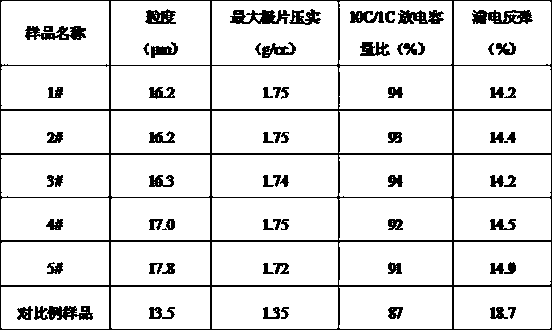Granulation process for high-compaction microcrystalline graphite negative electrode material
A technology of microcrystalline graphite and negative electrode materials, which is applied in the direction of graphite, negative electrodes, battery electrodes, etc., and can solve the problem of adhesive filling into microcrystalline graphite, poor secondary particle granulation effect, and increased viscosity of granulated materials, etc. problems, to achieve the effect of increasing energy consumption
- Summary
- Abstract
- Description
- Claims
- Application Information
AI Technical Summary
Problems solved by technology
Method used
Image
Examples
Embodiment 1
[0036] S1. Mixing: Mix 6 μm microcrystalline graphite powder with 15 μm petroleum asphalt with a softening point of 110°C using a fusion machine, the mixing mass ratio is 100:25, the speed of the fusion machine is 500 rpm, and the mixing time is 10 minutes.
[0037] S2. Low softening point granulation: heat up the fusion machine to a temperature of 107°C, adjust the rotation speed of the fusion machine to 50~200rpm, and perform fusion granulation for 60 minutes to obtain softened composite particles in which microcrystalline graphite is embedded in a binder.
[0038] S3. Preheating treatment: reduce the speed of the fusion machine to 20rpm, raise the temperature of the fusion machine to 500°C, keep warm for 3 hours, then turn off the electric heating switch of the fusion machine, cool to room temperature through the external circulating water, open the feeding valve, and turn on the reverse Transfer to blanking, and prepare preliminary particles of microcrystalline graphite and...
Embodiment 2
[0042] S1. Mixing: Mix 3 μm microcrystalline graphite powder with 13 μm coal tar pitch with a softening point of 110°C in a fusion machine, the mixing mass ratio is 100:25, the speed of the fusion machine is 500 rpm, and the mixing time is 10 minutes.
[0043] S2. Granulation with low softening point: heat up the fusion machine to a temperature of 107° C., adjust the rotation speed of the fusion machine to 100 rpm, and perform fusion and granulation for 100 minutes to obtain softened composite particles in which microcrystalline graphite is embedded in a binder.
[0044] S3. Preheating treatment: reduce the speed of the fusion machine to 20rpm, raise the temperature of the fusion machine to 500°C, keep warm for 3 hours, then turn off the electric heating switch of the fusion machine, cool it to room temperature through the external circulating water, open the feeding valve, and turn on the reverse Transfer to blanking, and prepare preliminary particles of microcrystalline graph...
Embodiment 3
[0048] S1. Mixing: Mix 6 μm microcrystalline graphite powder with 18 μm petroleum asphalt with a softening point of 105°C in a fusion machine, the mixing mass ratio is 100:25, the speed of the fusion machine is 500 rpm, and the mixing time is 10 minutes.
[0049] S2. Granulation with low softening point: heat up the fusion machine to a temperature of 102° C., adjust the rotation speed of the fusion machine to 50 rpm, and perform fusion and granulation for 60 minutes to obtain softened composite particles in which microcrystalline graphite is embedded in a binder.
[0050] S3. Preheating treatment: reduce the speed of the fusion machine to 20rpm, raise the temperature of the fusion machine to 500°C, keep warm for 3 hours, then turn off the electric heating switch of the fusion machine, cool to room temperature through the external circulating water, open the feeding valve, and turn on the reverse Transfer to blanking, and prepare preliminary particles of microcrystalline graphite ...
PUM
| Property | Measurement | Unit |
|---|---|---|
| particle size | aaaaa | aaaaa |
| particle size | aaaaa | aaaaa |
| softening point | aaaaa | aaaaa |
Abstract
Description
Claims
Application Information
 Login to View More
Login to View More - R&D
- Intellectual Property
- Life Sciences
- Materials
- Tech Scout
- Unparalleled Data Quality
- Higher Quality Content
- 60% Fewer Hallucinations
Browse by: Latest US Patents, China's latest patents, Technical Efficacy Thesaurus, Application Domain, Technology Topic, Popular Technical Reports.
© 2025 PatSnap. All rights reserved.Legal|Privacy policy|Modern Slavery Act Transparency Statement|Sitemap|About US| Contact US: help@patsnap.com

